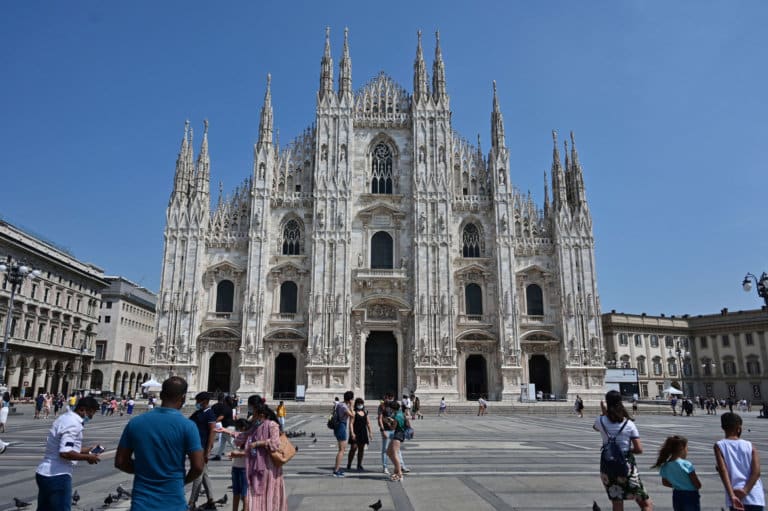
To study in Italy is to strike the perfect balance between getting an education and experiencing “la dolce vita” (Italian for “the sweet life”).
Home to wondrous architecture, stunning landscapes, a rich history and what’s arguably Europe’s most flavourful cuisine, the country is a bucket list destination for many.
Countless stomachs have been delighted with its unforgettable pastas and cheeses.
The glamorous houses of haute couture, from Gucci and Prada to Fendi and Giorgio Armani, dress everyone from royalty to today’s biggest streetwear moguls.
Walk anywhere and you’re greeted by a language that’s like music to the ears.
Study in Italy and that’s the reality you’ll live — one where the pleasures and joys of existence are pursued just as exuberantly as knowledge and skills on its campuses.
If this sounds like the European adventure you seek, read on for five things you need to know to study in Italy:

A benefit of studying in Italy is being surrounded by its glorious architecture. Source: Filippo Monteforte/AFP
How much does it cost to study in Italy?
Good news: Italy has budget-friendly options for international students. Generally, it costs around 900 to 4,000 euros to study in Italy at a public university.
However, this highly depends on what kind of programme you’re looking at, as well as if you choose a public or private university.
Undergraduate programmes at public universities will fall under the cheaper range.
For example, a bachelor’s programme at the Politecnico di Milano — the largest technical university in Italy — costs around 3,726 euros.
Despite this, you’ll likely not have to pay the full cost. The website itself states that only a “limited number of students” will be charged the total amount.
Most will have access to financial aid, which will significantly reduce the fee.
Private universities are more expensive. Niccolo Cusano University is a top-rated private institution in Rome with expertise in the sciences.
Students will have to pay around 7,200 euros for an undergraduate programme here, while master’s programmes start at 8,000 euros.
Is Italy a good option to study?
Italy is rich with many opportunities for travel, sightseeing, dining, history, archeological exploration and more.
More than that, Italy has a history of nurturing some of the world’s best minds, from the arts and humanities to the sciences and innovation.
In this, it’s a prime option for higher education.
For example, the University of Padua was ranked as the best university in Italy, according to US News and World Report.
At the same time, it is one of the first institutions in Europe for higher education.
Founded in 1222, it was intended for Italian and European students and scholars who sought a space to learn with cultural freedom and expression.
Its campus is a living embodiment of this.
Students walk through ancient buildings that represent the best of Italian architecture, traversing spiral staircases and stunning courtyards to get to their classes.
A UNESCO World Heritage Site and the first permanent anatomical theatre are some other great features of the Italian university.

From fresh ingredients to stunning landscapes, Italy is a great option for international students. Source: Andreas Solaro/AFP
What are the requirements to study in Italy?
There are a few conditions to study in Italy as an international student. The first step, of course, is to apply to your university of choice.
This is highly dependent on the requirements of each university, so be sure to pay close attention and provide all the materials necessary for your application.
Outside of university requirements, you will have to apply for an Italian student visa. This stage of your application is called the pre-enrolment procedure. With this, you have to submit your university application as well as a pre-enrolment application online through the Universitaly portal.
To apply, you will need:
- Your passport
- CV
- Academic transcripts
- The syllabus/course description of your chosen programme
- Your English or Italian language certificate
Other documents will depend on your university and programme of choice.
Of course, you might also need to brush up on your Italian skills. Most universities in Italy are taught in its native language, with many expanding to include English.
Still, you will need to know the basics of the language, as this might be a requirement for your study visa to be granted.
Is it worth studying in Italy for international students?
Italy is a great choice for international students for lots of reasons.
Outside of the relatively lower cost of education — at least in comparison to other institutions in Europe — Italy offers much to the curious student.
This is why Italy is often a first choice for international students who are keen to see the world.
Many universities offer exchange programmes through Erasmus+, which has financially supported over three million Europeans to spend part of their studies at another university abroad.
That being said, you should carefully consider your options before choosing to study in any one country.
Every higher education destination offers something different, and what might appeal to one student might not be suitable for you.
Be sure to make the right decision for yourself — one that will give you the ideal combination of experiences you’re looking for.










